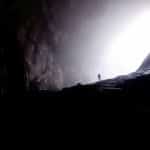Arithmetic is a sequence. One added onto another added onto another makes a smooth line that one is meant to follow to its logical conclusion: an answer that is easily understood. Two plus two equals four. Five plus five equals ten. If Samyah has three food and Yousef has two food, will they be able to feed their family until Thursday?
It is not so simple; life is not so simple.
The very aspect of living is not arithmetic. In undergrad, I dated a philosophy major (also a musician), who told me that logic and mathematics are in themselves fallible. That the only truth is in the arts: in what makes one feel, in what makes a person react. It was then that I had one of the several thoughts he didn’t agree with. I thought, then, that in pursuing the arts, one becomes more alive.
The thought itself is erroneous, but like all erroneous thoughts, it led somewhere.
It led me here.
Living is mercurial. Becoming more alive is a process of taking in and letting out—messy chemistry. This is evidenced as easily as taking one’s temperature. All that we once knew can be undone, can be untied and retied neatly later at a feverish pace. Such as this: as children in the United States, we’re to follow our ABCs as a hard and fast rule. And yet, in studying languages, the ABCs follow different orders, are written in different scripts. Nothing, nothing, in this life follows such succinct logic as simple as that song.
This is written in the budget of war, in its horror and its devastation. In the ignorance of hate. In the turn-the-other-cheek of genocide. Should one simply follow the simple rules of arithmetic and logic, it is simple to justify such things as rote. And yet, to become alive: to pull back the curtain and witness, one has to allow oneself to be more fluid. To allow oneself to become mercurial.
As a trans man, I know this better than some. As a disabled trans man, I know this better than some others. This is what I know: that life is filled with adaptations and changes, that the body is a mutable, changeable thing. That bodies are both themselves mercurial and can adapt (and must adapt) to their environment, and I must, too, have my body adapt to the environments that surround it. Some are welcoming, most are hateful.
There are different paths to this, and different angles to this.
It’s a practice in hostile geometry.
In reading for this issue, I reveled in seeing so many stories that spoke of the mind’s own perception of what exists and what is not there. The cultural need to have us follow along in the media and political rhetoric of the hostile geometry of what is required to sing along with their ABC’s. “Darnsworth Products” does this beautifully and succinctly. “The Sun Never Sets in Our Country” was the inspiration for the metaphor of this essay. And then “In the Loams of Hope” speaks of the mutable, changeable body. Finally, “The Other Sky” is an absurdist piece that flips our perspective on what is and what isn’t.
The poetry was an absolute delight. So delightful we added an extra poem to this issue.
We have poems of resistance (“Anticaprice/Chemical Engineering Mage”), of love lost and found and lost again (“A Record of My Emperor After the Elixir of Life”), of finding the self we need to be through games (“silksong::onechild”), a poem of bearing witness to destruction (“fox games”), and a poem about a very good frog (“Hoppers, the Wisest Frog in Space”).
The entire issue knows that living within simple arithmetic is a lie. That the foundations of who we are are mercurial, that the mind is more complex and more imaginative (and the world more mercurial) than we are to perceive at first glance. Not only because we, as humans, are subject to politics’ hostile geometry, but also because we, as humans, can see ourselves at our best angles, with our best parts. These stories and poems know that in order to become alive, we need to feel.
I hope this issue makes you feel alive.
Jordan Kurella
Apparition Literary Magazine is funded by our patrons, the editors, and by your kind donations. If you’d like to support us, you can follow us on Facebook or Twitter and please consider donating and/or subscribing via Patreon.
Thank you for reading
Rebecca Bennett, Amy Henry Robinson, Tacoma Tomilson, and Clarke Doty






